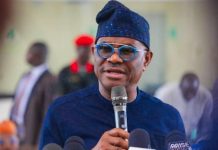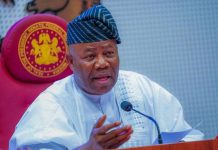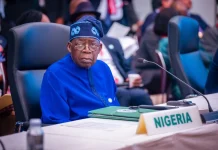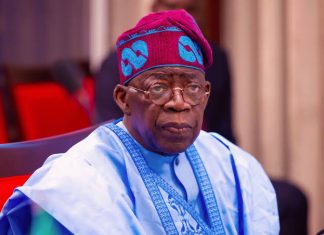On Tuesday, Speaker of the House of Representatives Tajudeen Abbas and Senate President Godswill Akpabio issued a warning against murdering Nigerians for having different political and religious beliefs.
They made the plea during the National Peace Committee’s “High-Level Discourse on Religion & Democracy” event in Abuja.
General Abdulsalami Abubakar, a former head of state, serves as the chairman of the NPC, an effort aimed at promoting peace and national unity.
Speaking on behalf of former Edo Governor Adams Oshimohole, Akpabio emphasized that a country with a large population like Nigeria shouldn’t be perceived as still experiencing religious intolerance.
“As we come together, we acknowledge that religion has the capacity to be a tremendous force for good,” he remarked. It can bring us together and promote mutual respect and understanding between our many communities. We must appreciate our humanity and accept our diversity.
We all have the fundamental right to freely practice our religion, and it is our shared responsibility to defend that freedom by making sure that no one is harassed or marginalized because of their decision. However, we have to face the unpleasant truth. We have all too frequently witnessed the abuse of religion as a means of conflict and separation.
“Our democratic values and the tenets that bind our society together are in risk of being undermined by the threats of violence and bigotry. The anguish and suffering brought forth by religious conflicts worldwide cannot be disregarded. An eye for an eye simply serves to blind the entire world, as Mahatma Gandhi once stated.
Abbas expressed his belief when he pointed out that the politicization of religion is one of the main issues confronting Nigeria’s democracy.
Julius Ihonvbere, the Majority Leader of the 10th House of Representatives, represented the Speaker, who acknowledged that religion continues to play a significant role in Nigerian politics.
Being a multicultural country, we have a wide range of cultures and religions, including indigenous beliefs in addition to the major religions of Islam and Christianity. Our democratic processes face both opportunities and problems as a result of these differences. Throughout history, religion has been a major influence on the standards and values of our society.
It has, yet, also given rise to disputes and discord. The negative effects of religious influence on our democracy must be addressed. For electoral purposes, political leaders use religious beliefs. These facts put us in a difficult situation that we need to handle with caution.
We have seen in recent years how religious beliefs can affect political affiliations and election results. Politics and religion can cause division among our populace and frequently make government more difficult. As we work toward a more inclusive democracy, it is imperative that we acknowledge these dynamics,” he said.
Bishop Mathew Kukah, the Archbishop of the Sokoto Diocese, stated in his speech that the nation must have a moral base upon which to fight the social ills caused by religious strife.
In his view, it is immoral for someone to kill another person in the sake of defending their faith.
As an example, the preacher brought up the case of Deborah Yakubu, a 200-level female student at Shehu Shagari College of Education in Sokoto, who was lynched and set ablaze by a crowd on a charge of blasphemy.
“Nigerians are dying every day in the name of democracy and religion,” he remarked. There must be a problem. The military’s dismantling of the intellectual role is one of its legacy from the past 30 years. During that period, General Babangida accused academics of teaching things for which they were not compensated.
As a result, it became illegal to assist regular Nigerians in thinking. And that legacy hasn’t fully healed us yet. As a result, we see a diverse range of people occupying this political space. How is it possible for someone to murder another person on the grounds that “you have allegedly sinned against my religion”?
Read Also: Court Settles 19years Property Dispute, Dismisses Uche Okoli, Multi-Shelter’s Case
“Humans are dying. The Deborah case took place in Sokoto. Soon after, a Muslim experienced it once more. Afterwards, I began to hear people ask me, “So, it is not (restricted to) only you Christians?” That is the same twisted view of religion. The fact that Muslims are also experiencing this does not alter the situation.
However, Kukah repeatedly emphasized the necessity of laying out a plan to help religious leaders realize that it is their duty to instill a moral compass in politicians so that they may successfully fulfill their pledges.
He asserts that prayer is not necessary for basic necessities like clean water, decent roads, and power.
Gautier Mignot, the European Union’s Ambassador-Designate to Nigeria and ECOWAS, said the EU is unwavering in its commitment to advancing world peace.
Mignot added that freedom of thought, conscience, and religion were guaranteed under Article 10 of the EU Charter on Fundamental Rights.
Join Television Nigerian Whatsapp Now
Join Television Nigerian Facebook Now
Join Television Nigerian Twitter Now
Join Television Nigerian YouTUbe Now





